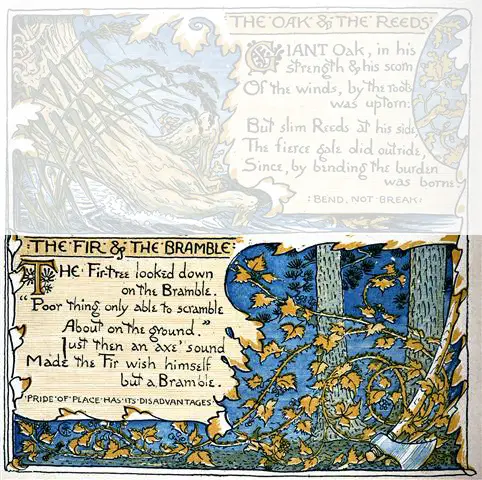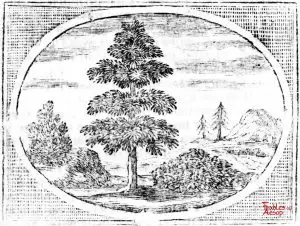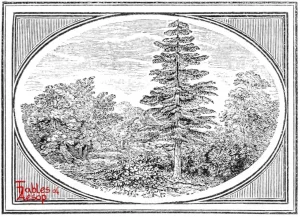A tree argues with a bramble about status when the lumberjack comes to cut the tree down. Oooops.
Better poverty without care, than riches with.
A Fir Tree boasted to the Bramble: “You have no use, while I am used in construction everywhere.” The Bramble answered: “To be used, you have to be cut down. Think on that and have reason to wish you grew up as a Bramble.”

JBR Collection
The Fir-tree treated with contempt the Bramble that grew at its foot. “I am put to many high and noble uses,” said he boastfully. “I furnish taper spars for ships, and beams for the roofs of palaces. You are trodden under foot, and despised by everybody.” “You talk very finely now,” replied the Bramble; “but, for all that, when once you feel the axe applied to your root, you’ll wish you had been a Bramble.”

Townsend version
A Fir Tree said boastingly to the Bramble, “You are useful for nothing at all; while I am everywhere used for roofs and houses.” The Bramble answered: ‘You poor creature, if you would only call to mind the axes and saws which are about to hew you down, you would have reason to wish that you had grown up a Bramble, not a Fir Tree.”
Moral
Better poverty without care, than riches with.

Samuel Croxall
A TALL straight Fir-tree, that stood towering up in the midst of a forest, was so proud of his dignity and high station, that he overlooked the little shrubs which grew beneath him. A Bramble, being one of the inferior throng, could by no means brook this haughty carriage, and therefore took him to task, and desired to know what he meant by it. Because, says the Fir-tree, I look upon myself as the first tree for beauty and rank, of any of the forest: my spring top shoots up into the clouds, and my branches display themselves with a perpetual beauty and verdure; while you lie groveling upon the ground, liable to be crushed by every fool that comes near you, and impoverished by the luxurious droppings which fall from my leaves. All this may be true, replied the Bramble; but when the woodman has marked you out for public use, and the sounding axe comes to be applied to your root, I am mistaken if you will not be glad to change conditions with the very worst of us.
THE APPLICATION
If the great were to reckon upon the mischiefs to which they are exposed, and poor private men consider the dangers which they many times escape, purely by being so, notwithstanding the seeming difference there appears to be between them, it would be no such easy matter, as most people think it, to determine which condition is the more preferable. A reasonable man would declare in favour of the latter, without the least hesitation, as knowing upon what a steady and safe security it is established. For the higher a man is exalted, the fairer mark he gives, and the more unlikely he is to escape a storm. What little foundation, therefore, has the greatest favourite of fortune, to behave himself with insolence to those below him, whose circumstances, though he is so elated with pride as to despise them, are, in the eye of every prudent man, more eligible than his own, and such as he himself, when the day of account comes, will wish he had never exceeded? For as the riches which many overgrown great ones call the goods of fortune, are seldom any other than the goods of the public, which they have imprudently and feloniously taken, so public justice generally overtakes them in the end; and, whatever their life may have been, their death is as ignominious and unpitied, as that of the meanest and most obscure thief.

Thomas Bewick (The Fir and The Bramble)
A tall Fir, that stood towering up in the forest, was so proud of his dignity and high station, that he looked with disdain upon the little shrubs that grew beneath him. A lowly Bramble had often been made to feel the insults and gloomy frowns of his lofty neighbour, who, on the slightest rufflings of the winds, shook his extended arms over the humble shrub, and upbraided him with his contemptible situation. As for me, said the Fir, I am the first in the forest for beauty and rank: my top shoots up into the clouds, and my branches display a perpetual verdure, whilst you lie grovelling upon the ground, and could not live were I to leave off sprinkling you with the drops from my extremities. At this the Bramble set up his prickles, and replied, that this haughtiness arose from pride and ignorance; for He that made thee a lofty tree, could, with equal ease, have made thee an humble Bramble; and high as thou art, a puff of His breath, in the message of a north wind, can rob thee of thy verdure, or lay thee low; and further, I pray thee tell me, when the woodman comes with his axe to fell timber, whether thou wouldst not rather be a Bramble than a Fir?
APPLICATION.
Pride, which was implanted in the human breast for wise purposes, should carefully be directed aright. It was intended only to exalt the minds of all ranks and conditions of men, to that pitch, which will make them spurn at, and despise the doing of a mean or dishonourable action; and it is only misapplied, when it puffs up those whom fortune has placed in high stations, or overloaded with riches, and tempts them to look down with derision on those below them. The higher a man is exalted in life, but especially if he have risen by dishonourable means, the more unlikely it is that he will escape a storm, or the mischiefs to which he may be exposed in his public capacity, in any convulsion that may befal his country. When public justice overtakes him, and he finds the day of reckoning near at hand, the honest monitor within will put him in mind of his true situation, and he will then be enabled to make a just comparison between his own lofty station, and that of the poor, but honest, man.


Crane Poetry Visual

The Fir tree looked down on the Bramble.
“Poor thing only able to scramble
About on the ground.”
Just then an axe sound
Made the Fir wish himself but a Bramble.
Pride of place has its disadvantages.

Abies et Dumus
Fertur olim abies despicere dumos. Iactitat se proceram esse, locari in aedibus, cum velo stare in navibus; dumos autem humiles, viles, nulli usui idoneos. Quorum quidem tale fuit responsum, “Tu sane, abies, tuis gloriare bonis, et nostris insultas malis. Verum nec tua refers mala, et nostra praeteris bona. Cum tu sonanti detruncaris securi, quam velles tum nobis, qui securi sumus, esse te similem!”
Perry #304


